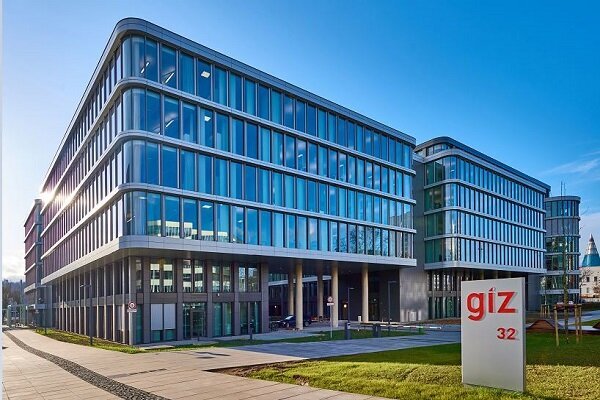Afghanistan and GIZ: A Longstanding Partnership for a Future Yet to Take Shape

Mehr News Agency, International Desk: The German Agency for International Cooperation (GIZ) has maintained a meaningful presence in Afghanistan that transcends its official roles in development and human rights. Through vocational training, resource management, and networking with local elites, this presence has enabled Berlin to sustain its influence at the crossroads of Central and West Asia.
Since the early 2000s following the fall of the Taliban regime and Afghanistan’s reconstruction efforts, GIZ has played an active role. Its official mandates primarily focused on rebuilding infrastructure, strengthening government institutions, technical skills training, economic development, and resource management. Over two decades, GIZ implemented projects involving renewable energy expansion, improvement of water and sewage systems, education enhancement, and agricultural development-playing a key part in reconstructing Afghanistan’s social and economic frameworks.
Despite political changes after 2021 with the Taliban’s return to power, GIZ did not cease operations but adjusted its approach. In summer 2024, it announced that from 2025 onward it would no longer maintain local or international staff on Afghan soil but would instead conduct projects through partnerships with local NGOs under external guidance. This shift reflects not a full withdrawal but a transition toward a low-cost indirect presence model.
Key GIZ Projects in Afghanistan
1. Expanding Access to Renewable Energy
This initiative was conducted on behalf of Germany’s Federal Ministry for Economic Cooperation and Development (BMZ). It focused on expanding renewable energy sources such as solar power systems with grid integration (net-metering) alongside academic training programs.
2. Micro-Hydropower Utilization
This project developed micro-hydropower plants in rural areas to link electricity production with local economic growth and empower small businesses.
3. Sustainable Economic Development and Job Creation
From 2014 to 2022 in northern Afghanistan provinces, this project enhanced agricultural value chains-including dairy products, nuts, and wheat-helping food security and employment through private sector engagement.
4. Reforming primary and Secondary Education
This program ran between January 2018 and may 2019 across Samangan، Badakhshan، Balkh، و herat provinces aiming to improve education quality through teacher training، curriculum design focusing on thematic subjects، gender rights courses، و monitoring tool development.
5. Urban Water Supply Improvement Program (WSIP)
Bearing from 2008 to 2013 across Kabul، herat، Mazar-e-Sharif، Kunduz، Faizabad,and othre northern/eastern cities ، this project supported managerial capacity building within water supply companies ،modernization of operational systems including metering billing,loss reduction ،and extending networks servicing peripheral neighborhoods و refugees alike .
The Underlying Motives Behind Germany’s Spending In afghanistan
An examination beyond official slogans like “development,” “human rights,” or “gender equality” reveals deeper reasons behind GIZ’s activities linked both to Germany’s regional geopolitical logic and structural elements of national development policy:
- 1. Geopolitical Influence & Regional Rivalry:
Afghanistan is pivotal as a connective hub between Central Asia , South Asia ,and West asia .Germany - having military/security experience within ISAF forces & police missions- aims post-NATO withdrawal}to preserve influence via ’soft’ developmental tools .This includes competition against China ’s Belt & Road Initiative ,russia ‘s security footprint ,Iran ‘s cultural-economic ties ,and turkey ‘s politico-religious sway . - 2.Network Building With Local Elites:
Most GIZ projects are conducted jointly with ministries ,local councils ,private sector actors creating durable channels linking Berlin directly with Afghan administrators.This network remains valuable even under taliban rule for intelligence gathering & lobbying purposes . - 3.Migration Management:
One core concern for Germany is regulating migratory flows toward Europe.Improving living conditions ,job creation ,& skills acquisition reduces costly migration pressures heading especially toward Germany 。 - 4.Protecting Economic Corridors And Strategic Resources :
Afghanistan possesses abundant minerals such as lithium & copper.GIZ facilitates soft infrastructure 、legal frameworks ,& workforce training paving way future entry by German enterprises into mineral sectors 。- 5.Strengthening Germany ‘ s Role Within EU Foreign Policy :
As ”Europe ‘ s developmental power,”Germany maintains an active base inside Afghanistan allowing it greater leverage over multilateral decisions concerning Kabul’ s future 。 - 5.Strengthening Germany ‘ s Role Within EU Foreign Policy :
Conclusion :
The role played by GIZ in Afghanistan extends far beyond humanitarian work.It represents multi-dimensional strategy together serving germany ‘ s geopolitical 、economic 、security ,& diplomatic interests.By shifting toward indirect involvement starting in 2025 ،Berlin seeks cost-risk reduction while preserving influence within evolving Afghan contexts .


